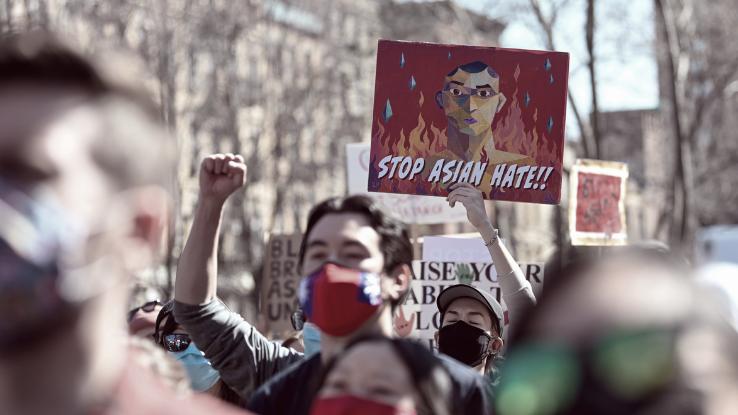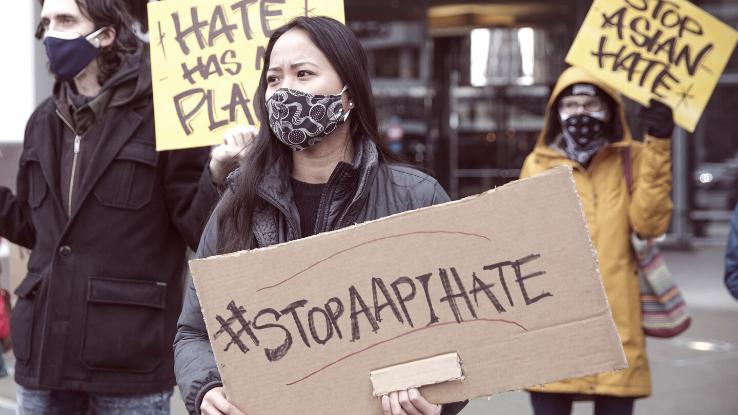
Throughout 2020 and 2021, we have witnessed an increase in anti-Asian racism across the country. Undoubtedly, these bigoted views have been exacerbated by how racist politicians have discussed, and tweeted about, the novel coronavirus. Not only has this led to a surge in verbal and physical attacks, but it has also meant fewer customers supporting Asian-owned businesses and restaurants.
“I knew anti-Asian sentiment existed long before the pandemic, but, until now, I have never felt this level of worry for my parents out in public,” NBC News investigative correspondent Vicky Nguyen told Today. “It has instilled a sense of sadness that’s new for me.” According to the Stop AAPI Hate reporting center, 3,795 incidents of hate crimes against Asian people and Pacific Islanders occurred between March 19, 2020 to February 28, 2021 — and those were just the verbal and physical assaults, civil rights violations, and instances of online harassment that folks actually reported.
A Dual Pandemic
It’s becoming increasingly clear that Asian and Pacific Islander folks are now “facing a dual pandemic: a heightened fear of racist abuse, from verbal slurs to physical assault, on top of all the anxiety of living through COVID-19” (via The Commonwealth Fund). To Nguyen’s point, despite more recent mainstream media coverage, anti-Asian hate has been “resurrected during times of war, pandemic and economic downturn,” professor and co-founder of Stop AAPI Hate Russell Jeung told Today.
On March 16, 2021, a white gunman committed a series of mass shootings in the Atlanta, Georgia metropolitan area, murdering eight people — six of whom were Asian women — at three spas or massage parlors. And, in cities across the United States, Asian elders have been increasingly targeted by the perpetrators of these hate crimes over the last year. “Even as overall hate crimes fell in 2020, hate crimes against Asian Americans in major U.S. cities grew nearly 150 percent,” PBS reports.
But standing against anti-Asian hate and racist attacks and attitudes requires more than just outrage. In order to stand in solidarity with the Asian American and Pacific Islander (AAPI) communities, you have to take real action. Here are some concrete action steps you can take at any time to support the #StopAAPIHate movement and AAPI communities.
Actions You Can Take to Stand Against Anti-Asian Racism
For many, solidarity looks like attending a protest or march. While showing up physically is a great way to lend support — especially if you’re a white ally — it isn’t the only way to join the #StopAAPIHate movement. Here are some other essential ways to take action.

Donate to On-the-Ground Organizations That Support the Immediate Needs of AAPI Communities
In 2020, Americans faced what The Cut aptly described as “compounding crises.” In addition to the devastating COVID-19 pandemic — which disproportionately impacted Black, Indigenous, and Latinx folks and resulted in the deaths of over 580,000 Americans — people have been grappling with high unemployment rates. The result? Many folks can’t afford rent or food. Last summer, in the wake of the police murder of George Floyd, Breonna Taylor, Tony McDade and other Black Americans, people became more involved in organizing and activism, making the Black Lives Matter protests the largest social movement in U.S. history.
But community support wasn’t confined to protests and marches. “Against this backdrop, where large swathes of the country feel abandoned by the government, the concept of mutual aid is quickly gaining mainstream recognition,” The Cut notes. People who participate in mutual aid voluntarily exchange resources, and take care of each other in a way that truly underscores the meaning of the word “community.” And, more often than not, supporting mutual aid and community-led fundraising initiatives is the most effective way to donate your money and share resources.
So, how can you directly help AAPI communities through mutual aid? In addition to Stop AAPI Hate, here are some other organizations doing essential on-the-ground work in our communities across the country:
- Red Canary Song: Self-described as “the only grassroots Chinese massage parlor worker coalition in the U.S.,” Red Canary Song aims to provide political representation and access to labor rights for sex workers — and, in particular, migrant sex workers. To get involved, you can donate here.
- The Asian Mental Health Collective: This nonprofit collective aims to build a community for mental health support that addresses the “specific barriers” Asian folks navigate when it comes to accessing mental health care.
- AAPI Journalists Therapy Relief Fund: This GoFundMe, which was started in association with the Asian American Journalists Association (AAJA), notes that “the journalism industry is calling on the most vulnerable to share their stories and provide on-the-ground reporting offering little financial compensation or emotional support in exchange for labor.” With this in mind, the fund aims to give folks access to mental wellness resources, so that they can process their trauma, which is, often, exacerbated by their work.
- Send Chinatown Love: “Businesses in Chinatown were hit first by the pandemic, suffering revenue losses of 60-80%,” Send Chinatown Love notes on its website. And, the truth is, business owners are still struggling. In addition to supporting merchants with donations, you can also partake in the Gift-a-Meal program.
- Cut Fruit Collective: Formerly Known as Save Our Chinatowns, the Cut Fruit Collective creates art for AAPI community care initiatives. “Since March 2020, together we’ve expressed community care through art, raising $75K+ for Bay Area Chinatowns and beyond during the pandemic,” the collective’s website notes. Support them with donations here.
- Heart of Dinner: To combat food insecurity and isolation, Heart of Dinner delivers meals and fresh produce to New York City’s Asian elders, all while supporting local businesses.
- National Asian Pacific American Women’s Forum (NAPAWF): The NAPAWF empowers Asian women through advocacy and policy reform. To help them enact that change, donate via their website.
There are countless other organizations doing essential work. Be sure to invest time in researching collectives, funds, and organizations that support your local (and, potentially, less high-profile) communities as well.
If You Witness a Hate Crime, Speak Out & Intervene
Asian Americans have to deal with the weight of micro-aggressions and the harm of racist comments and actions constantly. Shoulder some of that weight by doing your part to call out racism when you see it. Put a name to it for those who are perpetuating and espousing bigoted views — even if that means creating an “uncomfortable” situation between you and a friend, family member or coworker. After all, just being uncomfortable is a privilege.
In addition to speaking out against racist attacks online and in your day-to-day life, intervene when you see violence being enacted against an AAPI person. Speak up on their behalf, because, when one’s being attacked, self-advocacy can be near-impossible. “Over and over again, we heard from respondents [who submitted reports of hate] that it was hurtful to be targeted,” Cynthia Choi, Stop AAPI Hate’s co-founder, told PBS. “But it was even more hurtful to have no one stand with them — no one intervened when clearly they were being targeted because of their race, ethnicity and gender.”
To help, Stop AAPI Hate has compiled a list of things to consider when experiencing hate:
- Safety First: Trust your instincts and assess your surroundings. If you feel unsafe and you are able to, leave the area.
- Stay Calm: Take a deep breath, limit eye-contact, and maintain neutral body language.
- Speak Out (If you can do so safely): In a calm and firm voice establish physical boundaries, and denounce their behavior and comments.
- Seek Immediate Support: Ask bystanders for support or intervention.
- Seek Emotional Support: Once you feel safe, take time to recover and reach out to someone to talk about what happened. Remember this is not your fault, and you are not alone.
If you’re one of those bystanders mentioned in the fourth consideration, Stop AAPI Hate has also compiled ways you can prepare yourself to support others and intervene on their behalf. Bystanders should:
- Take Action: Approach the targeted person, introduce yourself, and offer support.
- Actively Listen: Ask before taking any actions and respect the targeted person’s wishes. Monitor the situation if needed.
- Ignore Attacker: Using your discretion, attempt to calm the situation by using your voice, body language, or distractions.
- Accompany: If the situation escalates, invite the targeted person to join you in leaving.
- Offer Emotional Support: Help the targeted person by asking how they’re feeling. Assist them in figuring out what they want to do next.
If you need other resources, check out the Southern Poverty Law Center’s “Speak Up” strategies, and consider participating in bystander trainings so that you can support others without creating a more volatile situation. Additionally, even after the incident, you can still help out by reporting the hate crime. Stop AAPI Hate, for example, offers reporting features in several languages, while the Asian Americans Advancing Justice’s (AAAJ) Stand Against Hatred site features both robust reporting features and a collection of stories.
Take Action in Your Communities
- Advocate for Change & Action in Your Workplace or Classroom: In the same way speaking out and correcting your friends and family can be daunting, speaking up in the workplace or classroom can be difficult. However, to stand in solidarity, using your voice, privilege and platform is a must. Encourage your workplace to invest in community days, volunteer events and fundraising efforts that specifically uplift AAPI folks. Moreover, advocate for the creation of employee resource groups (ERGs) and other initiatives that help create a more inclusive environment.
- Reach Out to Your Elected Officials: If you see an injustice — or continued injustices — reach out to community organizers, elected officials and other political leaders who can help enact meaningful change through law and policy. As always, the American Civil Liberties Union (ACLU) has some great tips for making phone calls and drafting emails.
- Volunteer With Local Organizations & Become Aware of Community Resources: Depending upon where you live, look for local organizations you can donate your time to and support. This is an especially great option for folks who may not be able to lend financial support. For example, Compassion in Oakland offers many volunteer opportunities, including the chance to provide protective chaperone services for elderly Asian folks in the city’s Chinatown neighborhood.
- Support Protestors — Either by Attending Protests or Providing Supplies: If you can, attend protests to show your support and help grow the #StopAAPIHate movement’s reach. However, if you can’t attend a protest, you can still support protestors’ efforts by donating supplies, like water, snacks and more. As always, you can continue to support community-organized funds for AAPI safety.
- Support AAPI Artists & Local AAPI-Owned Businesses and Restaurants: Shopping locally is always a great idea as it keeps money within our communities, allowing us to support each other. In addition to ordering from local AAPI-owned restaurants, try to buy art, groceries, and other products from AAPI artists and business owners.
Educate Yourself About the History of Anti-Asian Discrimination in the U.S.
While education is often seen as a more passive act, it’s still fundamental. And a good first step, especially considering the long history of anti-Asian racism in the U.S. Take this action further by circulating resources, info guides, books and more on social media (and outside of it). Be sure to always check your sources and aim to uplift AAPI voices speaking on their own histories and the histories of their communities.






